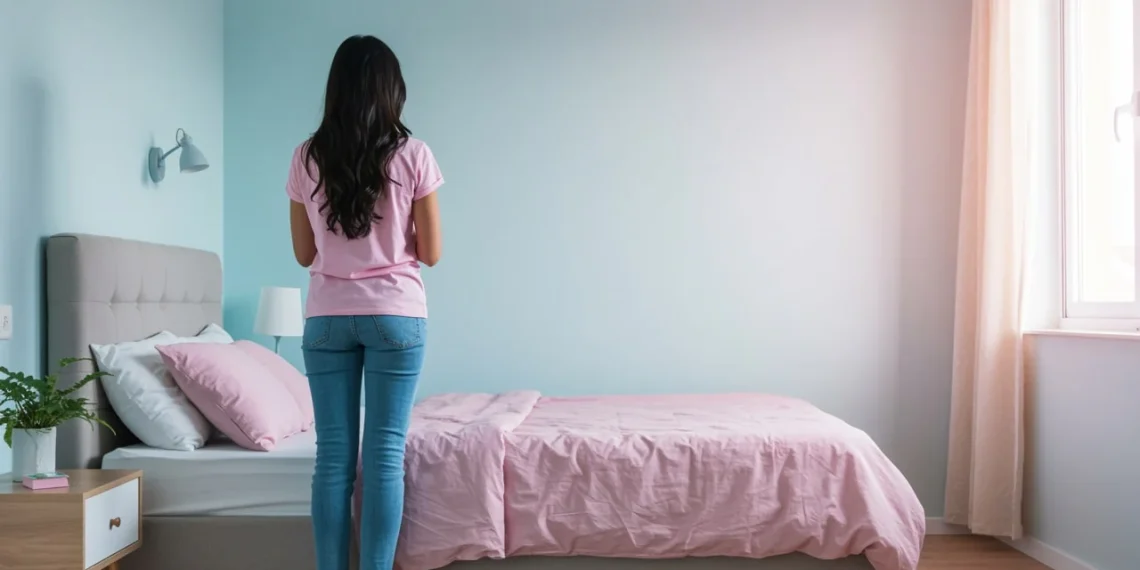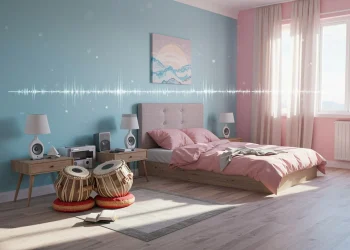Have you ever wondered if the direction you sleep could be the missing piece in your quest for better rest? While it might sound like ancient folklore, the science of sleep direction has deep roots in both traditional wisdom and modern research. Whether you’re a student burning the midnight oil, a professional climbing the corporate ladder, or a senior seeking restorative sleep, understanding south direction sleep benefits versus east direction sleep advantages could transform your nightly rest.
At SleepyCart, our sleep experts have observed fascinating patterns in how different sleeping orientations affect our customers’ sleep quality and daily performance. Today, we’ll explore the compelling differences between these two primary sleep directions and help you determine which might be your pathway to optimal rest.
The Fundamental Difference: South vs East Sleep Orientation
South Direction Sleep: The Stability Choice
Sleeping with your head pointing south has earned recognition as the most universally beneficial sleep direction. This orientation aligns your body with Earth’s magnetic field, creating what sleep researchers call “magnetic harmony.”
When you position your head toward the south, your body’s natural magnetic field works in tandem with the planet’s magnetic pull. This alignment reduces magnetic interference that can subtly disrupt your sleep cycles. The south direction sleep benefits extend beyond mere comfort – they touch the very core of how our bodies interact with natural forces.
Traditional Vastu Shastra principles strongly advocate for south-facing sleep, considering it the direction of stability and grounding. Modern sleep studies have found correlations between southern orientation and deeper REM sleep phases, which are crucial for memory consolidation and emotional processing.
East Direction Sleep: The Energy Direction
East direction sleep represents awakening, renewal, and mental clarity. This orientation captures the symbolic and literal power of the rising sun, making it particularly beneficial for those seeking enhanced cognitive function and creative inspiration.
Eastern sleeping positions have been linked to improved morning alertness and faster wake-up times. Sleep chronobiology research suggests that east-facing sleepers often experience more synchronized circadian rhythms, especially during seasonal transitions.
The traditional significance of east as the direction of new beginnings translates into measurable benefits for learning, memory retention, and problem-solving abilities. Students and creative professionals often report heightened mental sharpness when consistently sleeping with their heads pointing east.
Life Stage Considerations: Matching Direction to Your Current Goals
Students and Young Adults (18-25): The Learning Phase
For students and young adults focused on academic achievement and skill development, east direction sleep often proves most beneficial. The enhanced cognitive function associated with eastern orientation supports the intense learning demands of this life stage.
Research from sleep laboratories indicates that east-facing sleepers show improved memory consolidation rates, particularly for procedural and declarative memories. This makes eastern orientation ideal during exam periods, skill acquisition phases, or when learning new technologies.
However, students experiencing high stress or anxiety might benefit from alternating between east and south directions. The grounding effect of south direction sleep benefits can provide emotional stability during particularly challenging academic periods.
Professionals and Career Builders (25-45): The Achievement Phase
Working professionals face unique sleep challenges that require strategic directional choices. High-stress careers, irregular schedules, and constant decision-making create specific sleep needs that different orientations can address.
For professionals in demanding roles, south direction sleeping provides the stability and deep rest necessary for stress recovery. The grounding effect helps process work-related tensions and promotes the deep sleep stages essential for physical recovery.
Creative professionals, entrepreneurs, and those in innovation-driven fields often thrive with east direction sleep. The enhanced mental clarity and creative thinking associated with eastern orientation support breakthrough thinking and problem-solving abilities.
Seniors and Wellness Seekers (45+): The Restoration Phase
As we age, our sleep architecture naturally changes, making directional choice increasingly important for quality rest. Senior sleepers typically benefit most from south direction sleep benefits, which promote the deep, restorative sleep crucial for healthy aging.
The stability associated with southern orientation helps regulate age-related sleep disruptions and supports the immune system functions that become more important with advancing years. Additionally, the grounding effect can help manage age-related anxiety and promote emotional well-being.
The Science Behind Sleep Direction
Magnetic Field Interactions
Earth’s magnetic field runs from north to south, creating a natural energy flow that our bodies can either work with or against. When we sleep with our heads pointing south, we align with this magnetic flow, potentially reducing the subtle stress that magnetic opposition can create.
Magnetobiology studies have shown that magnetic field alignment can influence melatonin production, core body temperature regulation, and even cellular repair processes during sleep. While the effects are subtle, they accumulate over time, potentially contributing to long-term sleep quality improvements.
Circadian Rhythm Optimization
East direction sleep specifically supports circadian rhythm regulation through symbolic and physiological connections to sunrise patterns. The eastern orientation appears to enhance the body’s natural light sensitivity, making it easier to maintain consistent sleep-wake cycles.
Sleep researchers have noted that east-facing sleepers often experience more predictable sleep onset times and more natural wake patterns, particularly during seasons with varying daylight hours.
Vastu Shastra and Traditional Wisdom
Ancient Vastu principles provide detailed guidance on sleep direction, viewing it as essential for harmonious living. According to these traditions, sleeping directions influence not just physical rest but also mental clarity, emotional stability, and spiritual well-being.
The south direction sleep benefits in Vastu include enhanced stability, better family relationships, and improved financial prosperity. These traditional beliefs align surprisingly well with modern findings about stress reduction and emotional regulation.
Practical Switching Strategies for Life Transitions
The Gradual Transition Method
Changing sleep direction shouldn’t be abrupt. Your body needs time to adjust to new magnetic alignment and spatial orientation. Start by shifting your sleeping position gradually over a week, moving your pillow a few degrees each night until you reach your target direction.
Monitor your sleep quality during the transition using simple metrics like wake-up energy levels, dream recall, and mid-night awakening frequency. Most people notice directional effects within 2-3 weeks of consistent practice.
Seasonal Direction Switching
Some sleep optimization experts recommend seasonal direction changes to maximize benefits throughout the year. Consider east direction sleep during periods requiring enhanced focus and creativity, such as new project launches or learning phases.
Switch to south direction during high-stress periods, major life changes, or when prioritizing deep recovery sleep. This flexible approach allows you to customize your sleep environment to match your changing life demands.
Family Bedroom Arrangements
In shared bedrooms, finding compromise directions can benefit everyone. South-southeast or south-southwest orientations provide modified south direction sleep benefits while accommodating different family members’ needs.
Consider rotating sleeping arrangements seasonally or using this as an opportunity to experiment with different directions for various family members based on their individual life stages and goals.
Regional Preferences and Cultural Integration
Indian Traditional Practices
In Indian households, sleep direction often follows generational wisdom passed down through families. Many families have specific directional preferences based on regional Vastu interpretations and local climate considerations.
Northern Indian families traditionally favor south-facing sleep for its stability benefits, while some southern regions incorporate east-facing practices for enhanced mental clarity. Understanding your family’s traditional practices can help you make informed decisions about potential changes.
Modern Adaptations
Contemporary urban living sometimes makes ideal directional sleep challenging due to apartment layouts and space constraints. Creative solutions include angled sleeping positions that approximate ideal directions or using feng shui principles to enhance sleep energy regardless of exact orientation.
The key is finding the closest approximation to your preferred direction while maintaining comfort and practicality in your living space.
Making Your Personal Choice
Choosing between south direction sleep benefits and east direction sleep ultimately depends on your current life goals, stress levels, and personal sleep challenges. Consider experimenting with both orientations for several weeks each, tracking your sleep quality, energy levels, and daily performance.
Remember that sleep direction is just one component of optimal sleep hygiene. Combining directional awareness with quality bedding, proper room temperature, and consistent sleep schedules creates the most comprehensive approach to sleep optimization.
Conclusion: Your Path to Directional Sleep Mastery
The choice between south and east sleep directions isn’t about finding a universal “best” option – it’s about discovering what works best for your unique life situation. Whether you’re drawn to the stability of south direction sleep benefits or the mental clarity of east direction sleep, the key is mindful experimentation and consistent practice.
At SleepyCart, we believe that every element of your sleep environment should support your personal wellness journey. From choosing the right direction to selecting the perfect mattress and bedding, we’re here to help you create your ideal sleep sanctuary.
Ready to optimize your sleep direction? Start your experiment tonight and discover how this ancient wisdom can enhance your modern life. Explore our collection of compass-aligned bed frames and directional sleep accessories to support your journey toward better rest.







